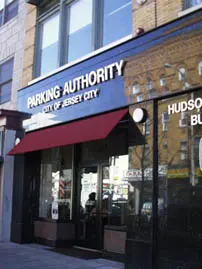The biggest parking scofflaw in town may be the city government itself. Because the city is dealing with a budget crisis, it has not paid a little more than $1 million that it owes to the Jersey City Parking Authority. And the JCPA is not alone. The city has been forced to curb, or halt altogether, payments to various agencies that help to maintain services throughout the city. In a letter drafted this week by the JCPA Board of Commissioners, the autonomous agency has threatened to stop providing necessary services to the city until they get their money. The services include street cleaning, snow shoveling, taxiing ill and elderly people during snowstorms and of course, issuing parking violation summonses. The letter was addressed to Mayor Bret Schundler, Business Administrator Robert Lombard and Council President Thomas DeGise. The city’s woes stem from a yawning budget gap that Mayor Bret Schundler wants the state to fill with aid. So far, the state has not. Now seven months into the fiscal year, the City Council has been approving temporary appropriations so that it can make necessary payments. JCPA Executive Director Carmine Venezia said that the city has paid only $350,000 toward the $1.4 million that is slated for Parking Authority payrolls. City Business Administrator Robert Lombard did not return calls and could not be reached for comment. The city has an agreement with the Parking Authority that has the municipal government subsidizing the agency dollar for dollar with hopes that some day, the Parking Authority will be self-sufficient. The city has already asked the Parking Authority to cut back its own budget and get by with less money. In exchange, no members of the Parking Authority lost their jobs as part of a recent citywide purge that took approximately 150 jobs through layoffs and buyouts. According to Venezia, this is a case of the city and the JCPA having to work together to get the city out of its hole. In the past, the JCPA and the municipal government have had a quid-pro-quo relationship. “What we do for the city, the city does for us,” Venezia said. In earlier years, when the city was not as fiscally-challenged, the Parking Authority received more than its share of the wealth. When the JCPA was functioning with broken-down motor scooters and could not afford to purchase new ones on their own, the administration was there with $150,000 for them. Many of the properties that the Parking Authority has been able to sell off to private investors and developers were handed down from the city. Without having the properties transferred from city to JCPA ownership, the Parking Authority would have never gotten anything. These reasons have Venezia confident that the Parking Authority will eventually get its share this year. “I have every confidence in this administration,” Venezia said. “They gave their word to me.” But just in case Despite Venezia’s confidence, his commissioners went ahead and drafted the letter anyway. He said that he advised them that there are other options to be explored. “The commissioners are doing their job in drafting the letter,” Venezia said. “But this is the result of a combination of bad things happening. As a city, we have to work together to solve the problem.” Because they are charged with the task of enforcing parking, the JCPA has always been looked on less than favorably by many drivers. Venezia was quick to point out that since 1994, the Parking Authority has reduced the number of tickets issued by 400 a day. Over a week’s time, that adds up to a reduction of more than 1,000 tickets written each week. But without tickets being issued to those that break the law, Venezia maintained that taxes would be greatly affected. Without approximately $10 million in revenues coming in through parking enforcement last year, the taxes – still to be determined as the council continues to sift through the budget – will be much greater. “One hand does wash the other,” Venezia said. Venezia also said that the fact that the JCPA and the city are on different schedules confuses things. With the JCPA’s fiscal year running from October to September, the agency does not open and close its books at the same time as the city does. Jersey City’s municipal budget year runs from July to June to keep pace with the calendar year that the state of New Jersey operates on.
Our Digital Archive from 2000 – 2016
